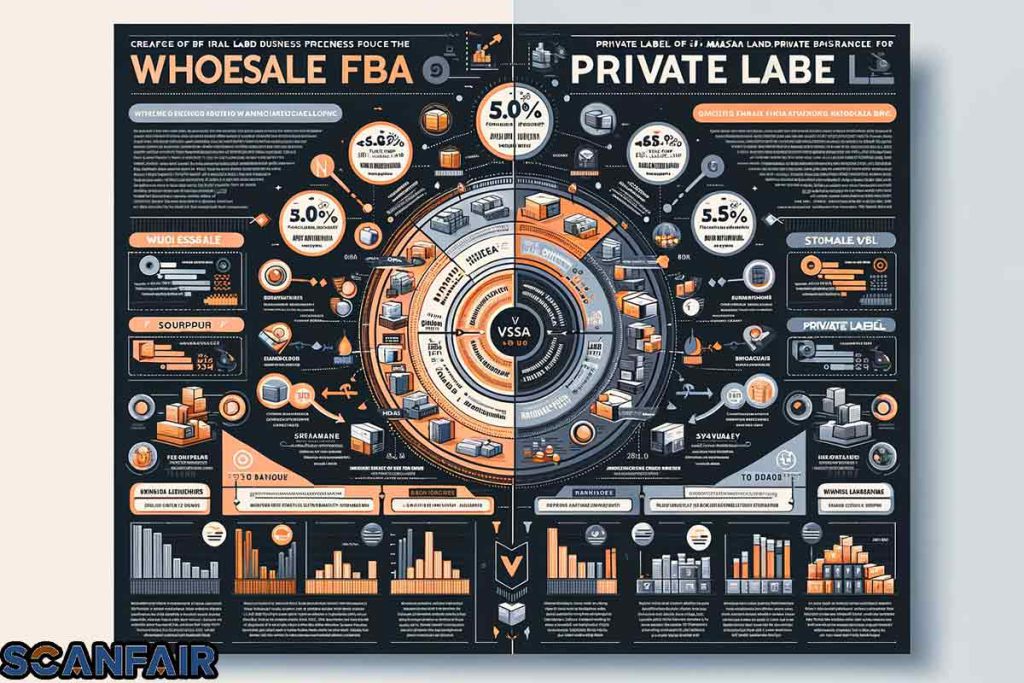In the dynamic world of Amazon FBA (Fulfillment by Amazon), two primary business models have emerged as frontrunners: Wholesale and Private Label. Each model offers unique opportunities and challenges for sellers on the Amazon platform. The Wholesale model revolves around purchasing bulk products from suppliers or manufacturers at a discounted rate and reselling them on Amazon. This approach is characterized by selling established brands and products, focusing on volume sales, and often involves a lower risk due to the pre-existing demand for known brands. In contrast, the Private Label model entails creating one’s brand and products. This approach allows greater control over branding, pricing, and product differentiation. Sellers source products from manufacturers, but with the crucial step of branding them under their label. While it offers higher margins and brand control, it also involves significant upfront investment in product development and marketing. Understanding these models is crucial for leveraging the Amazon marketplace effectively, as each carries distinct strategic, financial, and operational implications. In the essay, we at Scan Fair will talk more about this topic.
The Wholesale Model on Amazon FBA: A Deep Dive
Amazon FBA’s wholesale model is a robust pathway for entrepreneurs looking to enter the e-commerce marketplace. This model involves purchasing products in bulk from manufacturers or distributors at a discounted rate and then reselling them on Amazon. A vital advantage of the wholesale model is its reliance on established products and brands, which reduces market-entry risks. Sellers don’t need to invest in brand creation or product development; they’re trading in products with a market presence and demand.
Wholesale Model on Amazon FBA Explained
Sourcing: The success of the wholesale model hinges on finding reliable suppliers who offer products at competitive prices. This requires extensive research and networking to establish fruitful relationships with manufacturers or distributors who can provide high-demand products consistently.
Scalability: One of the attractive features of the wholesale model is its scalability. As sales volume grows, businesses can negotiate better prices and terms with suppliers, increasing their profit margins. However, managing more significant inventory levels and ensuring consistent supply chain stability become more critical as the business scales.
Market Dynamics: Understanding market trends and consumer behavior is crucial in the wholesale model. Sellers must stay updated with trends, seasonal demands, and competitors’ pricing strategies. This dynamic market requires constant attention and adaptability to ensure the inventory aligns with consumer needs and market trends. We have already reviewed Fba vs. Fbm you can refer to these pages for more information.
Private Label Success on Amazon: Strategies and Challenges
Private labeling on Amazon presents a pathway to branding autonomy, allowing sellers to market products under their brand. While these offer margins and brand control, this model demands substantial product development, branding, and marketing investment. Sellers must create a unique product, develop a strong brand identity, and strategically market their brand to stand out in the competitive Amazon marketplace.
Private Label Approach & Challenges
Product Creation: Success in private labeling begins with identifying and creating products that meet specific market needs or preferences. This process involves thorough market research, ensuring quality, and sometimes customizing products to create a unique offering.
Branding: Effective branding is critical, encompassing everything from logo design to the overall brand message, aimed at establishing a solid connection with the target audience.
Challenges: Private label sellers often face intense competition, high upfront costs, and the necessity of continuous innovation and marketing efforts to maintain relevance and customer interest.
Wholesale vs Private Label Profits
Understanding the profit margins in Amazon FBA’s Wholesale and Private Label models is crucial for sellers deciding which path to pursue. The Wholesale model typically involves lower profit margins per unit due to selling established products at competitive market prices. However, this can be offset by high-volume sales. In contrast, Private Label can offer higher profit margins per unit since sellers have greater control over pricing and branding, allowing for a premium on their unique products.
Profit Analysis: Wholesale vs Private Label
Profit margins in the Wholesale model are often slimmer, ranging around 10-20%, primarily due to market competition and the cost of purchasing established brand products. The key to success here lies in efficient inventory turnover and volume sales.
In Private Labels, margins can be significantly higher, sometimes reaching 30-50%, as sellers can set their prices. However, this model requires more upfront investment in product development, branding, and marketing, which can affect net profits initially.
Both models require different strategies for maximizing profits: Wholesale demands efficient operations and volume sales, while Private Label focuses on brand value and product uniqueness. Sellers must weigh these factors against their resources, expertise, and market understanding to choose the model that best fits their business goals.
Managing Wholesale vs Private Label
The operational dynamics of managing an Amazon FBA business vary significantly between the Wholesale and Private Label models, each presenting unique challenges and efficiencies. In the Wholesale model, operations hinge on managing relationships with established suppliers and handling bulk inventory. This model benefits from potentially simpler supply chain logistics due to dealing with pre-existing products. However, it can suffer from tight margins that require careful inventory management to avoid overstocking or stockouts.
Inventory & Logistics in FBA Models
In Wholesale, effective inventory management and strong supplier relationships are paramount. Sellers must negotiate favorable terms and ensure a reliable supply of products. Balancing inventory levels with market demand to optimize turnover and minimize holding costs is the challenge.
Private Label sellers’ operational focus shifts towards product development, branding, and quality control. Establishing a solid relationship with manufacturers is crucial to meet product specifications. This model faces logistical challenges in sourcing, product customization, and maintaining quality consistency. Both models demand a strategic approach to logistics, but Private Label requires more upfront investment in product design and branding, influencing the ease of management.
Market Trends: What’s Hot in Amazon FBA for 2024
As we look towards 2024, Amazon FBA is witnessing a shift in market trends affecting wholesale and private label sellers. Sustainability and eco-friendly products are becoming increasingly popular, reflecting a growing consumer demand for responsible consumption. Health and wellness products also continue to surge in popularity, spurred by a heightened collective focus on wellbeing. Technological advancements also influence product offerings, with smart home devices and personal tech becoming more prevalent. These trends guide sellers towards niches that promise high demand and align with evolving consumer values.
Trends in Amazon FBA: Wholesale & Private
For wholesale sellers, the trend towards sustainability and eco-friendliness means a shift towards sourcing products that meet these consumer demands. This includes biodegradable packaging and products made from recycled materials. Health and wellness trends prompt sellers to stock up on fitness, nutrition, and self-care products. For private-label sellers, the opportunity lies in creating innovative products that tap into these trends, such as unique wellness supplements or eco-friendly gadgets. Both strategies require an adaptive approach to product selection and marketing, emphasizing the importance of staying ahead in a rapidly changing market landscape.
Risk Management in FBA Models
Engaging in Amazon FBA through wholesale or private label models comes with its risks. Wholesale sellers face the challenge of thin margins and high competition, mainly when selling products in saturated markets. This model is also susceptible to fluctuations in supply chain reliability, which can impact product availability and sales. On the other hand, private label ventures involve higher upfront costs related to product development and branding. There’s also the risk of market acceptance, where a newly launched product may not resonate with consumers as anticipated.
Mitigating Risks in Wholesale & Private
To mitigate these risks, wholesale sellers should focus on diversifying their product range and building robust relationships with multiple suppliers to ensure supply chain stability. Effective market research and dynamic pricing strategies can also help navigate competitive pressures. For private label sellers, thorough market research before product development is crucial to ensure market fit.
Building a solid brand and engaging in effective marketing strategies can enhance product visibility and acceptance. Additionally, starting small with minimally viable products can reduce upfront costs and allow for iterative improvements based on consumer feedback. Both models benefit from a keen understanding of market trends and consumer preferences, enabling sellers to adapt their strategies accordingly.
Wholesale & Private Label Successes
The Amazon FBA landscape is filled with success stories that testify to the viability of wholesale and private-label models. A notable success story in Wholesale involves a seller capitalizing on the demand for eco-friendly products. By establishing solid relationships with sustainable goods manufacturers, they were able to offer a curated selection of products that resonated with environmentally conscious consumers, leading to significant sales growth.
Inspiration from FBA Success Stories
On the private label side, an entrepreneur’s journey to success began with the launch of a unique kitchen gadget. Through extensive market research, they identified a gap in the market for a high-quality, innovative product. They built a strong brand presence with strategic branding and targeted marketing campaigns, leading to impressive sales volumes and a loyal customer base. These stories highlight the importance of understanding market needs, strategic planning, and effective execution in achieving success on Amazon FBA.
Expert Tips: Maximizing Your Profits with Amazon FBA
Maximizing profits on Amazon FBA through wholesale or private label models requires strategic planning and execution. Experts recommend focusing on niche markets with lower competition, allowing for higher profit margins. Optimizing your listings with high-quality images and SEO-friendly titles and descriptions can significantly improve visibility and sales. Additionally, leveraging Amazon’s advertising tools to promote your products can drive further revenue. Effective inventory management is crucial to avoid long-term storage fees and to meet customer demand without overstocking.
Expert Tips for Maximizing FBA Profits
Understanding your customer base and gathering data on their buying behavior for both models can inform your marketing strategies and product development. Regularly reviewing your performance metrics on Amazon can highlight areas for improvement or expansion. Experts also stress the importance of continuous learning and adaptation to the evolving marketplace, suggesting that sellers stay informed about Amazon’s policy changes and market trends. Building a brand, whether in Wholesale by selecting reputable products or in private label by creating unique offerings, can lead to long-term success and customer loyalty.
The Future of Amazon FBA: Wholesale vs. Private Label Prospects
The landscape of Amazon FBA is poised for a significant evolution in the coming years, with wholesale and private-label models facing transformative trends. Technological advancements like AI and machine learning are expected to streamline operations, from inventory management to customer service, providing a more personalized shopping experience. Sustainability and ethical sourcing will become increasingly critical, influencing buyer preferences and seller practices. For wholesalers, the future may involve deeper integration with global supply chains and a focus on exclusive distributor agreements to secure competitive advantages.
Future of Amazon FBA: What’s Next?
Private label sellers will likely emphasize brand differentiation through innovative products and enhanced customer engagement strategies. As competition intensifies, both models will need to adapt to changing consumer behaviors, with a shift towards more niche markets and sustainable products. The role of data analytics in decision-making will become more pronounced, enabling sellers to anticipate market trends and adapt their strategies accordingly. Ultimately, success on Amazon FBA will hinge on agility, innovation, and the ability to align with evolving customer values and technological capabilities.
Conclusion
Choosing between Amazon FBA’s wholesale and private label models depends on individual business goals, resources, and risk tolerance. While wholesale offers a quicker start with lower upfront costs, it comes with thinner margins and high competition. Private label, on the other hand, requires more initial investment but offers higher margins and brand control. Both paths demand dedication, market research, and strategic planning. Adaptability and a keen understanding of consumer trends become crucial as the marketplace evolves. Ultimately, success on Amazon FBA is not just about selecting a model but mastering it through continuous learning and innovation.



